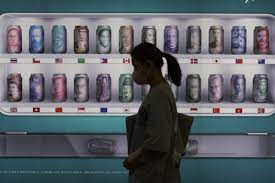Beijing, Sept 23:Global stocks fell for a third day Friday after more rate hikes by the Federal Reserve and other central banks to control persistent inflation spurred fears of a possible global recession.
London and Frankfurt opened lower. Shanghai, Hong Kong and Seoul declined. Oil prices fell by more than $1 per barrel. Japanese markets were closed for a holiday.
Wall Street futures were lower following rate hikes Thursday by central banks in Britain, Switzerland, Turkey and the Philippines. The Fed hiked its key rate on Wednesday for a fifth time this year and indicated more rises were on the way.
“Global equities are struggling as the world anticipates surging rates will trigger a much sooner and possibly severe global recession,” Edward Moya of Oanda said in a report.
In early trading, the FTSE 100 in London lost 0.6% to 7,127.70 and the DAX in Frankfurt shed 0.3% to 12,490.55. The CAC 40 in Paris was 0.2% lower at 5,905.20.
On Wall Street, futures for the benchmark S&P 500 index and Dow Jones Industrial Average were off 0.4%.
On Thursday, the S&P 500 lost 0.8%. The Dow fell 0.4% and the Nasdaq composite slid 1.4%.
In Asia, the Shanghai Composite Index lost 0.7% to 3,088.36 and Hong Kong’s Hang Seng sank 1.1% to 17,953.50. The Kospi in Seoul tumbled 1.8% to 2,290.00.
Sydney’s S&P-ASX 200 fell 1.9% to 6,574.70 and India’s Sensex retreated 1.5% to 58,231.49. New Zealand and Southeast Asian markets declined.
Also Friday, Vietnam’s central bank raised a key lending rate by a full 1 percentage point, surprising forecasters. The State Bank of Vietnam appeared to be trying to cool inflation while also discouraging a capital outflow in search of higher interest rates abroad.
Investors worry central banks might be willing to tolerate a painful economic slump to get prices under control.
Some point to signs the U.S. Economy is cooling as support for the Fed to back off plans for more rate hikes. But chair Jerome Powell said Wednesday rates will be kept elevated for an extended time if needed to get inflation back to its 2% target.
U.S. Consumer inflation eased to 8.3% in August from the previous month’s 9.1% peak. But core inflation, which strips out volatile food and energy prices to give a clearer picture of the trend, rose to 0.6% over the previous month, up from July’s 0.3% increase. That indicated pressure for prices to rise still was strong.
The Fed on Wednesday lifted its benchmark rate, which affects many consumer and business loans, to a range of 3% to 3.25%. It released a forecast showing it expects that benchmark rate to be 4.4% by the year’s end, a full point higher than envisioned in June.
Traders also are looking ahead to quarterly financial results from big companies.
In energy markets, benchmark U.S. Crude lost $1.23 to $82.26 per barrel in electronic trading on the New York Mercantile Exchange. The contract rose 55 cents to $83.49 on Thursday. Brent crude, used to price international oils, declined $1.24 to $88.29 per barrel in London. It rose 63 cents the previous session to $90.46.
The dollar retreated to 142.39 yen from Thursday’s 142.49 yen. The euro declined to 97.63 cents from 98.31 cents. (AP)


